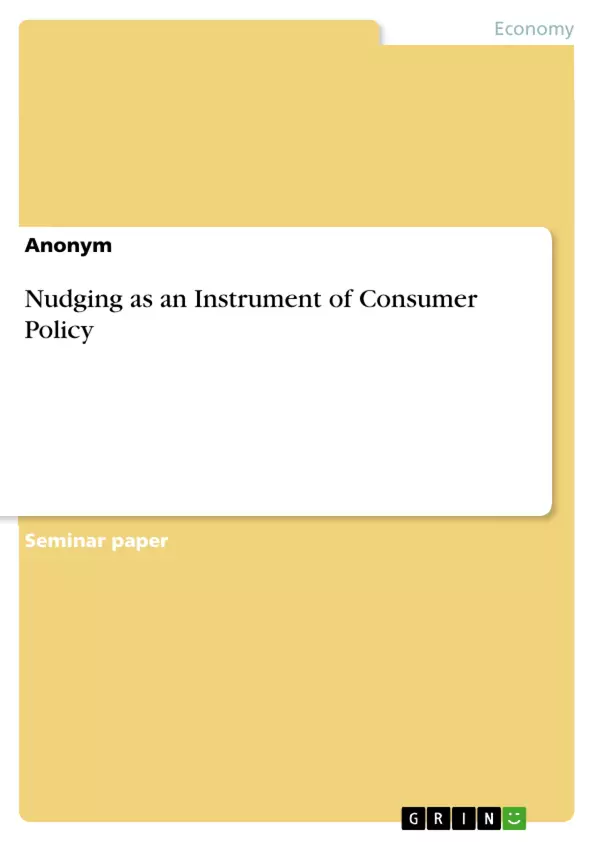How can nudge apply in policies that attracts people consume sustainable? This is the main research question we discuss in this paper. First, we focus on a conceptualization of nudging and toolkits, then bring the theoretic tools into practical cases, which present concrete examples of nudging.
Behavioral economics has evolved and seems to show consistent patterns that are not easily reconciled with the axioms of behavior in neoclassical economics. Thus, it is an instrumental way to apply behavioral economics, which brings social psychology into policy making. Nudge, one of the policy instruments, helps enhance or improve the implementation of legislation and regulations, or even substitute traditional policies. Nudging influences behavior towards specific outcomes without forcing any changing values of people. However, there are still limitations of nudge that are ineffectiveness, inefficiency and the lack of evidences.
Inhaltsverzeichnis (Table of Contents)
- Introduction
- Theoretical Methdology
- The rise of nudge
- When do we need a nudge?
- Limitation
- Literature review
- Nudge as Practical Applications
- Nudge as CO2 reduction
- Nudge as waste reduction
- Conclusion
Zielsetzung und Themenschwerpunkte (Objectives and Key Themes)
This paper explores the application of nudge theory in policies designed to encourage sustainable consumption. The main research question is how nudge can be effectively implemented in policies aimed at promoting sustainable behavior. The paper focuses on the conceptualization of nudging and its toolkits, and then applies these theoretical tools to practical examples, showcasing concrete instances of nudging in action.
- The application of nudge theory to promote sustainable consumption.
- The conceptualization and toolkits of nudge theory.
- Practical examples of nudging in promoting sustainable behavior.
- The limitations and challenges of nudge theory.
- A comparison of nudge theory with traditional economic approaches to behavior change.
Zusammenfassung der Kapitel (Chapter Summaries)
The introduction of the paper sets the stage by discussing the changing climate and the need for effective policies to promote sustainable consumption. It highlights the potential of nudge theory as a tool for influencing human behavior in a desirable direction without resorting to coercion.
Chapter 2 delves into the theoretical methodology of nudge theory. It traces the origins of the term “nudge” and its definition as a tool for behavior change. The chapter examines the conditions under which nudging is most effective, including choices with delayed effects, high degrees of difficulty, infrequent decision-making, poor feedback, and ambiguity between choice and experience. It further explores the limitations of nudging, such as its potential ineffectiveness and inefficiency, the need for context-specific implementation, and the challenges of collecting sufficient evidence.
Chapter 3 presents a literature review, contrasting the nudge theory approach with traditional economic theories. It explores the concept of bounded rationality and how it challenges the assumptions of neoclassical economics, which assumes perfectly rational individuals. The chapter examines alternative mechanisms for behavior change in economic activity, such as altering prices, providing information, and placing restrictions.
Schlüsselwörter (Keywords)
The primary keywords and focus topics of this paper include nudge theory, sustainable consumption, behavior change, choice architecture, bounded rationality, neoclassical economics, policy interventions, practical applications, limitations, and evidence-based approaches.
- Citar trabajo
- Anonym (Autor), 2019, Nudging as an Instrument of Consumer Policy, Múnich, GRIN Verlag, https://www.grin.com/document/1022278



